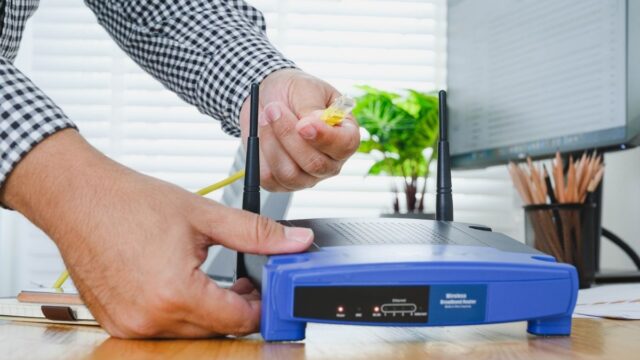A VPN isn’t just for your computer – Here’s why you need a VPN on your router, too

If you aren’t protecting your router, you’re exposing a weak spot for cybercriminals to strike. Don’t be like the millions of people using outdated routers or weak default passwords. That’s right: A study from Comparitech found that one in 16 home Wi-Fi routers use their manufacturer’s default admin password.
If you’re reading this and just realized you never gave your router a unique password, do it ASAP. Some websites provide every manufacturer’s default password. A hacker can find that default password quickly, break into your router and infect your home network.
Once you create a strong password for your router, just know you aren’t entirely in the clear. Next, you need to install a VPN on your router. Here’s what you need to know, brought to you by our sponsor, ExpressVPN.
How a VPN router works
A VPN router gives you the privacy, security, and location-changing benefits of a VPN right on your router. This means all the devices in your home can use a VPN — no apps are needed. Here are some specific benefits.
- IP and location changes. Your devices get a different IP address, concealing your real IP. This also lets you appear to be in a location of your choice.
- Strong encryption. All your online traffic is encrypted, so third parties like your internet service provider cannot see what you’re doing online.
- Protects all devices. A major advantage of a VPN router is that it extends the benefits of a VPN to devices that can’t normally install one, such as smart doorbells.
Choosing a router
If you’re not in the market for a new router, make sure your VPN can connect to the one you have. Just head to your VPN’s website and research router connections. For example, if you’re using ExpressVPN, here’s a list of compatible routers, along with steps to download ExpressVPN onto the router or manually install the software.
If your router is slow and outdated it might be time to upgrade. Here are four things to keep in mind when looking to buy a new router:
- Compatibility. If you plan to install VPN software on your new router, you must choose one that is compatible with your VPN.
- Ease of setup. You can buy a router and manually set it up, or get one that comes pre-configured with a VPN to avoid the hassle.
- Speed and bands. The newer your Wi-Fi technology, the more powerful its speeds and coverage.
- VPN features. If you’re buying a router with VPN preinstalled, look at the VPN service’s features.
That’s not all ExpressVPN can do for you
Big tech corporations are supposed to safely handle our personal online data, but now they’re getting into the political game. I don’t want to be a part of that, nor should you. That’s why I trust and use ExpressVPN.
Companies use your public IP address to match your internet activity to your identity or location, but with ExpressVPN, no one can see your IP address.
Protect your privacy. Get three months free when you sign up for one year at ExpressVPN.com/Kim.
Tags: cybercriminals, security

